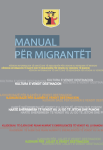Trafficking Vulnerabilities and Risk Factors: Preventing Trafficking and Supporting Safe Migration and Resiliency
Implementing Agencies: NEXUS Institute, Fafo and Different & Equal
Geographic Scope: Albania
Years: 2011-2015
Project Summary: A common criticism of many anti-trafficking awareness raising efforts is that they often provide general information about trafficking but no alternatives in terms of income generation, poverty alleviation, or mechanisms for potential victims to cope within their socio-economic framework. Without alternatives or resiliency strategies in their home communities, many individuals and families do not see any option apart from (often risky) migration. In this context, there is a great need to identify factors that protect against these unwanted outcomes, whether they be strategies that eliminate the need for migration or make migration safer.
This project employed a “positive deviance” (PD) methodology, which recognizes that in all communities there are indigenous coping mechanisms and resiliency strategies that allow individuals to negotiate the risk of trafficking in spite of their limited opportunities. That is, even in the most adverse circumstances, some individuals adopt beneficial practices and are able to avoid trafficking, while others with similar resources and experiences are trafficked. The identification and mobilization of PD practices allows those at risk to protect themselves and prevent trafficking and engages community members in looking within their own communities to discover successful and affordable solutions.
In this project, Fafo and NEXUS (two research institutes) partnered with the Albanian anti-trafficking NGO Different & Equal (D&E) to pilot a trafficking prevention project in a town in Albania, drawing on this “positive deviance” methodology, which is a unique approach to behavioral and social change. The pilot project was implemented over the course of two years in Albania, starting in 2011, and consisted of two main phases:
Phase 1. Identifying PD strategies. This involved conducting a Positive Deviance Inquiry (PDI), to gather and assess information about the local context of trafficking and of migration more broadly. The central goal was to identify PD practices that could form the foundation for safer migration. Another goal of this phase was to mobilize support for and local commitment to the project.
Phase 2. PD project implementation. The second phase involved mobilizing the PD strategies identified through the PDI, in close cooperation with the community itself. A central process was to collaboratively identify and implement locally appropriate and relevant methods for social mobilization around the issues of trafficking prevention and safe migration. The process of project implementation, as well as the project results and lessons learned are discussed in the studies below.
The project was generously funded by the Norwegian Ministry of Foreign Affairs.
Project Publications and Studies
Preventing Human Trafficking: Positive Deviance Methodology in Practice (2015)
This paper, jointly authored by NEXUS Institute and Fafo, is intended as a resource for practitioners working in the field of trafficking prevention, as well as others who are considering implementing a positive deviance methodology or similar approach. We discuss our experiences in developing and implementing a positive deviance trafficking prevention project in a town in Albania. First we offer an overview of the positive deviance methodology; then we outline potential and previous uses of positive deviance in the trafficking field; next we provide a description of the pilot prevention project in Albania; and finally we explore some overarching issues and considerations in using positive deviance to prevent trafficking, highlighting both potential opportunities and limitations. We end with an annotated bibliography that offers a list of literature and resources on positive deviance methodology generally, as well as specifically in terms of its application in the field of human trafficking.
Reframing Trafficking Prevention: Lessons from a “Positive Deviance” Approach (2015)
This study discusses our piloting of a project to prevent human trafficking utilizing the positive deviance approach. For this pilot project, NEXUS Institute and Fafo partnered with the Albanian anti-trafficking NGO Different & Equal (D&E), thereby bringing together both research and practice in collaboratively developing and implementing this project. Our interest in the positive deviance approach emerged from learning about its previous application in the prevention of trafficking of girls into the sex industry in Indonesia. Having conducted research on trafficking in many different countries and regions, one of our general observations over time has been that what works in one context may not be equally successful elsewhere. We were, therefore, interested to see if this approach (positive deviance) could potentially be used more broadly – in this case in another geographical, social and economic environment, as well as adapted to adult trafficking victims and victims of trafficking for labor as well as sexual exploitation.
Migrant Handbook (2015)
available in Albanian
The Migrant Handbook contains information about services for returned migrants in the communities where they reside in Albania, as well as in destination countries. Along with practical safe migration tips, the Migrant Handbook includes a service map of Kuçova, Albania and contact information for services for victims of trafficking, both in Albania and in Greece.




